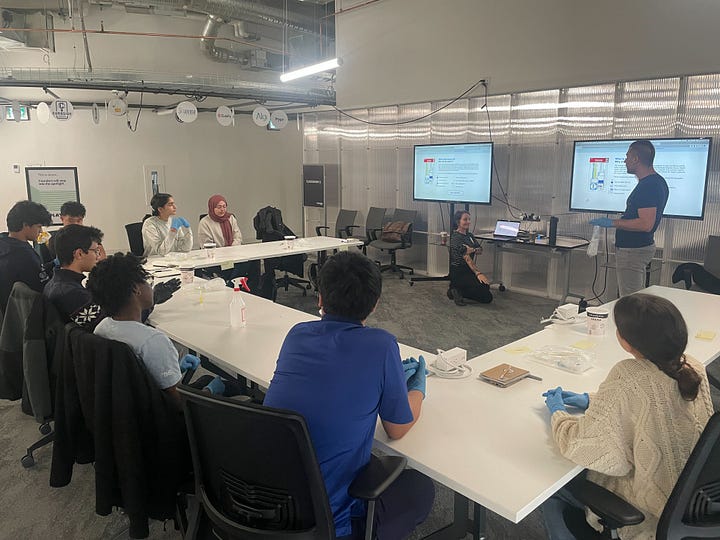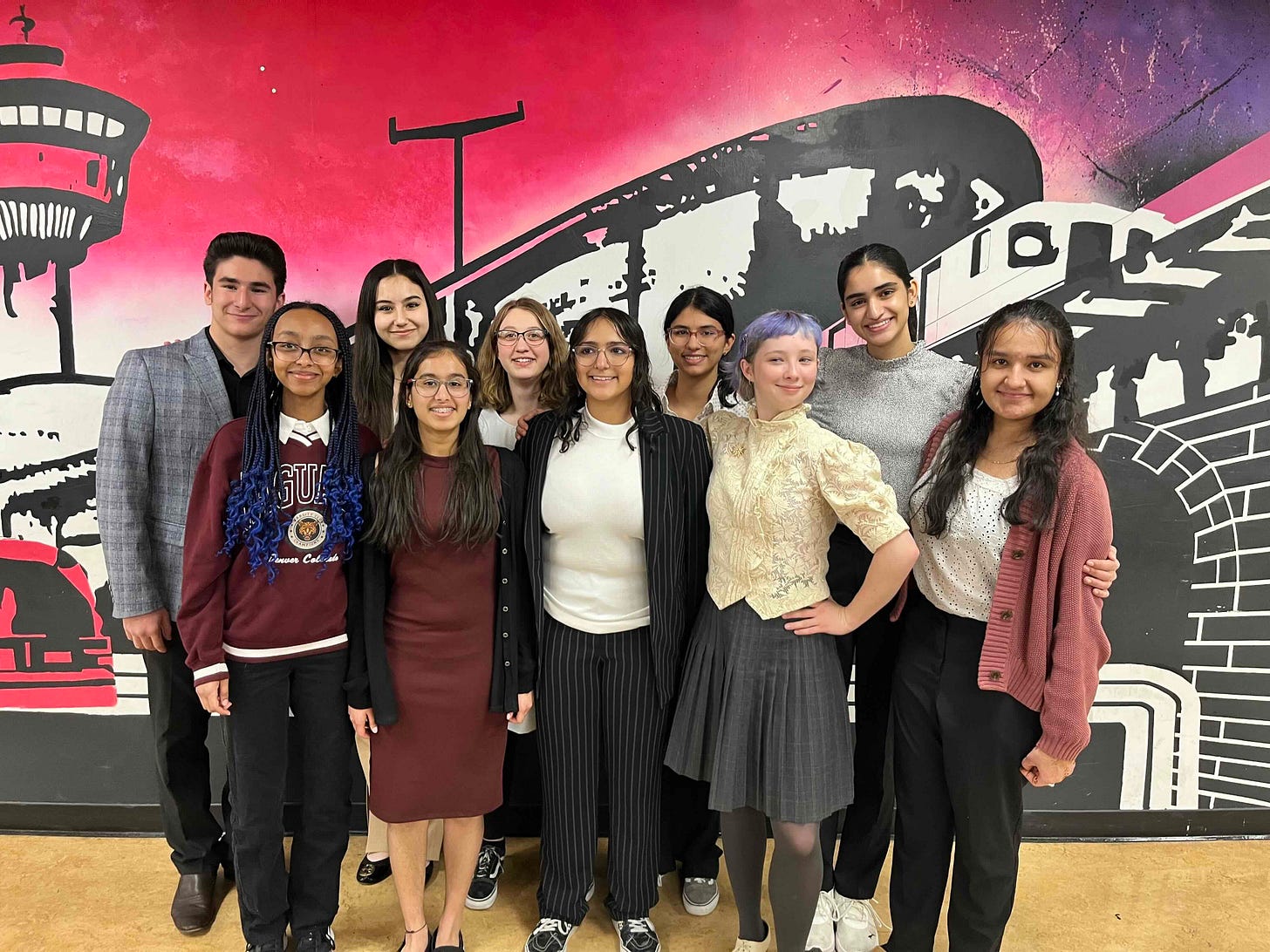Hey there!
I’m Inayat, a 16-year-old innovator from Calgary who is passionate about biotech, psychology, and everything else that makes our world an interesting place- I don’t discriminate when it comes to learning.
This month has been nothing short of a whirlwind of learning, discovery, and innovation for me. From my first debate competition to learning about humanity’s newest superpower, this month has been eventful, and I’m thrilled to share these experiences with you. So, let’s dive in!
Learning to Speak…from the start:
Public speaking can be scary, especially when there are several people staring at you, judging you, timing you, and waiting to cut you off when you reach that exact 8-minute mark. Simply put, welcome to debate.
This month, I competed in my first debate competition, and it exposed me to these three skills that I believe everyone, debaters and non-debaters, should have:
Think on your feet: Developing arguments on the spot is a big part of debate: brainstorming ideas, persuading judges with my opinions, and executing the perfect delivery. This transcends into other aspects of life as well, where the ability to handle a difficult situation and articulate well makes a difference.
Present in the moment: When the other team is giving their case, I have to actively listen for their points and potential buffers. Being actively engaged and "present in the moment" allows you to avoid getting sidetracked. I noticed that this is an important asset in maintaining relationships and engaging with other people.
Confidence Overpowers: My opponent's case may be stronger, but nothing will cause me to lose my confidence. Standing up in front of the audience, I own the stage and the microphone, and by showcasing a boss mentality, I can command the attention of the room. I learned that confidence comes from within, and it's more than just appearing sure of yourself; it's about truly believing in your abilities.
Bringing Robotics to the Community
I’m part of F.R.C. Robotics team, the Sparkans, and as the on-season is approaching, I can already feel the wave of excitement from FRC teams around the world.
As the team lead for outreach, this month has been full of sending emails, following up with phone calls and my favourite part: hosting workshops. These workshops have allowed younger kids to come to our events and learn about robotics, developing their design thinking and problem-solving skills.




Being part of a robotics team has been an incredible journey that has not just taught me about the technical aspects but also helped build confidence and resilience Initially, the idea of shouldering responsibilities, organizing events, and leading a team felt overwhelming, but this was because I didn't believe in myself to manage everything.
There is a difference between appearing sure of yourself and strongly believing in your ability. By tweaking my thinking from "I could, should" to "I will, I am", I affirmed my ideas. Looking back over this month, it's remarkable to observe how consistency and a shift in mindset significantly influenced the growth of my confidence.
Insights from the IoT Canada Conference and the WISEST Conference:
This past month, I had the opportunity to attend two conferences, and each had its individual niche targeting different audiences.
The IoT conference brought in speakers and businesses from around Canada that are integrating AI into their business and policies, automating their main systems, tackling issues within the health sector, and being part of this innovative community gave a glimpse into what many businesses and cities are implementing for the future. The WISEST conference welcomes passionate female innovators to participate in workshops, meet university students, and tour the campus.
Although both conferences had a different genre, to me, they acted as a force in developing a key skill: outreach.
The art of outreach:
Going up to strangers, reaching out your hand, smiling, and introducing yourself was daunting at first, but similar to any difficult activity out there, the more you do it, the less uncomfortable it becomes.
The laws of motion play quite beautifully into this: Newton’s Laws detail concepts such as inertia, momentum, velocity—and they all play a role when it comes to success. The initial push is hard and takes a lot of energy and force to complete, but once that phase is over, the rest of the journey is much easier to complete since you've fostered the momentum. Each introduction I add becomes easier, and these conferences are the key factor that allows me to exercise this skill and become more comfortable.
Are you ready for the future?
Playing Around with Bacteria!




The world of biology is fascinating, and the Amino Labs workshop I attended encapsulated the uses of synthetic biology.
Mona Lisa and the Starry Nights—those pieces of artwork are nothing compared to the artwork I drew. Sure, they capture the soul with their delicate yet overpowering beauty, but the real art is more than aesthetics. This form of art was about capturing the beauty of life.
There are various applications of synthetic biology. In medicine, it helps create tailored microbes for medicines. Agriculture benefits from modified crops with improved resistance. Industries use engineered microorganisms for eco-friendly chemical and material production.
Harnessing the Power of the Brain:
Another realm within Biotechnology is neurotechnology. Recently, Elon Musk’s company, Neuralink, got their product FDA-approved for testing.
This is a big deal because their product is an innovative treatment for many of the world's physical disabilities. Neuralinks product comes under the umbrella of brain-computer interfaces. BCIs record signals from our brain that can be recorded by a variety of methods. Whether it’s measuring blood flow, water diffusion, or brainwaves, it allows us to look into everything that’s happening in the body. The best part? We can extract this data and apply it to build prosthetics, create mind-controlled technology, and bring the world one step closer to superhuman abilities.
Guess what? You’re in luck—here’s an article breaking down this incredible technology:
By delving deeper into this technology, it exposed me to an important human trait everyone should possess: Empathy
Neurotechnology and using BCIs for individuals who have disabilities relies on our skill of empathy- being able to go down to that individual’s level and understand the problem to create the best solution. Our world can get caught up on the big picture of solving the problem that we miss the most important thing- understanding the needs and concerns.
I’ve learned to be more inclusive, thoughtful and grateful for the people in my life because understanding others and helping them in times of need can provide birth to the best solutions out there.
Many successful individuals who are engineers, teachers, founders and politicians all exhibit the ability to understand other perspectives.
The key to everything is empathy, because nothing is more fruitful than walking in the shoes of others.” — Satya Nadella, Microsoft CEO
Monthly Reads
She reads books as one would breath air, to fill up and live. -Annie Dillard
What You’ll Wish You’d Known by Paul Graham
You start being an adult when you decide to take responsibility for your life. You can do that at any age.
Caste: The Origin of our Discontents
The price of privilege is the moral duty to act when one sees another person treated unfairly. And the least that a person in the dominant caste can do is not make the pain any worse.
Spare by Prince Harry
The Heir and the Spare—there was no judgment about it, but also no ambiguity. I was the shadow, the support, the Plan B….This was all made explicitly clear to me from the start of life’s journey.
Coming Up:
Working On Solving a Problem Given by a Billion-Dollar Company🤑
Working on translating raw eeg data 🧠
Robotics Workshop Coming to TELUS Spark! 🎉
The End of 2023~ A yearly reflection 🗒








